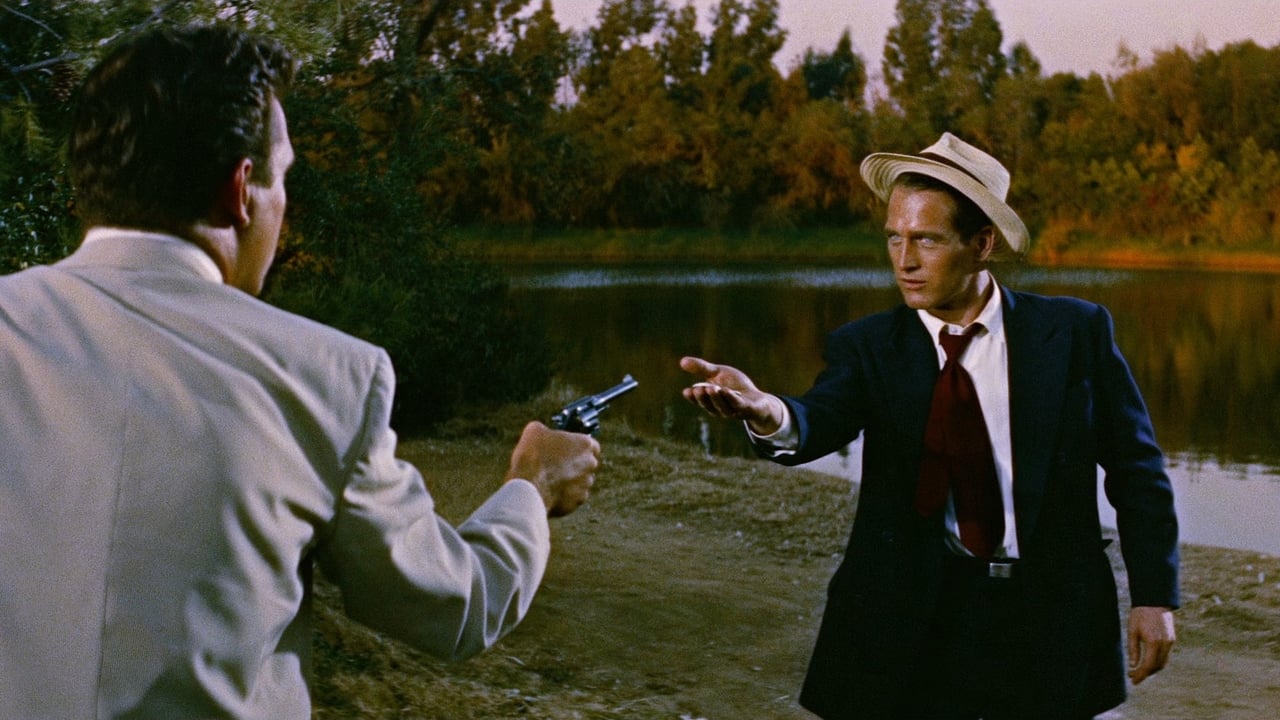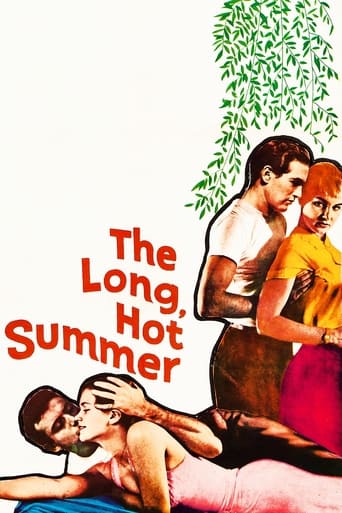

For anyone who likes real-life Hollywood love stories, you won't want to miss this one! Tracy and Hepburn, Bogart and Bacall, Gable and Lombard, and thanks to The Long, Hot Summer, Paul Newman and Joanne Woodward join the list.While it isn't the most romantic movie in the world, and in fact doesn't usually come to mind when you think about cinematic love stories, it brought the two together during the ridiculously hot film set in Louisiana. Anyone who's spent a summer in the South knows how sweltering it can be, and director Martin Ritt wanted the actors' sweat to look authentic! The story is simple: an ambitious drifter sweet talks the boss's daughter in order to move up in the world. The legacy is enduring, as Ma and Pa Newman have made more than their marks in the world.If you want to watch the movie that brought them together, this is the one. If you're looking for a good love story from the 1950s, this is not the one. Try Picnic or Cat on a Hot Tin Roof instead. The movie is a little slow at times, and a little wordy. And Joanne seriously needed to let her bangs grow!
... View MoreThe Long, Hot Summer – Big Footprint Not to be mistaken for Wet Hot American Summer (a markedly different romp ), The Long, Hot Summer seems to be a largely forgotten entry into the canon of sweltering 1950s melodramas, mostly historically noteworthy as the project which united Paul Newman and Joanne Woodward, and generally overshadowed by higher profile ballads of illicit love and family angst in the deep south. However, rather than being clouded by a haze of 'Big Daddy's odour of mendacity,' Martin Ritt's film easily has enough merit to stand on its own accord, blending a collection of William Faulkner shorts into a tale of love, lust, and lineage, just clamoring for the qualifier 'steamy'.Although the plot is definitely familiar territory, and the script errs fairly strongly on the affected style customary to the post-Actors Studio era, the story resonates truthfully and remains engaging throughout, while the alluring undercurrent of barely-bridled sexuality keeps the proceedings energetic and urgent. Ritt's direction is taut but unfussy, allowing the inherent claustrophobia and tension of the film's small-town setting to speak for itself, and the sumptuous Technicolor cinematography is so crisp you can practically smell the marsh and sweat from the Mississippi bayou (and I'm not even just talking about Orson Welles). Although the climax feels like a somewhat forced attempt to escalate the stakes simmering throughout, with an overly hasty resolution to boot, the buildup is calm and confident enough to make the viewing experience worth its while without having to fight to engage its audience.Naturally, like the majority of its contemporaries, the story ultimately exists as a vehicle to foreground the performances of the cast, who are what ultimately make the film worthwhile. Paul Newman, cementing his iconic identity as the shrewd, laconic, effortlessly cool drifter, crackles with charisma as accused arsonist Ben Quick, magnetic throughout even before his surprisingly racy shirtless scene. Joanne Woodward gives arguably the film's strongest performance as the controversially unmarried Clara Varner, practically vibrating in place from a lifetime of feeling discounted and under-appreciated. Rather than playing up her predicament, however, Woodward embodies Clara with a steely confidence, which is altogether more effective and appealing. In contrast, Orson Welles delivers the film's most legendarily outlandish performance as the resident belligerent patriarch. Notoriously mocking the Actors' Studio by mumbling almost incomprehensibly through his cartoonish southern drawl, the vociferous Welles is skilled enough to steal scenes in his sleep (which he may well have been during certain scenes), outrageously fun when hamming it up, with occasional pockets of surprising solemnity and depth, as if coming up for air from his customary grunting and snorting. Anthony Franciosa is also a sturdy presence, even if he does occasionally overindulge in Method hand-wringing and hysteria, while a cameo from the delightful Angela Lansbury as Welles' cheerily aggressive suitor adds a dash of comedic perfection.While it may fall short of the acerbic intensity of similar fare such as Cat on a Hot Tin Roof, The Long, Hot Summer still serves a healthy slice of all the smouldering, robustly acted 1950s melodrama you could ask for. If only for the incandescent interplay between Newman and Woodward, with the added pleasure of cartoon-character Welles, the film is easily worth sinking into, on a dozy, hot summer evening or otherwise.-7/10
... View MoreWhen I was young, I read The Sound and the Fury and a couple of novellas (Old Man, The Bear) by Faulkner. I conceived a dislike of this man's writing that has stayed with me until this day. His tortured prose makes that of late Henry James a pleasure to read in comparison. Faulkner writes as though he were telling Homeric legends, but without the clarity and simplicity of Homer. The script fashioned by Ravetch and Frank out of various stories has the great benefit of humor and a kind of easy sexuality that is very enjoyable to watch.The Jody Varner character makes no sense--how can he be virile with Eula and impotent with his father? Franciosa seems very unsure of himself in every scene. Ben Quick and Clara have such a great time together: Newman and Woodward are establishing a rapport that would last 50 years. The story needed a convincing patriarch, and there was no-one better than Orson Welles to play Varner. I don't care if his make up was shoddy or his accent virtually incomprehensible, he is wonderful. I could have given it 10, had there not been inconsistencies of plot and characterization.
... View MoreA wealthy but repulsive curmudgeon named Will Varner (Orson Welles) lords over a small Southern town, spouting out orders and expectations to everyone in his orbit, especially his two grown children: Clara (Joanne Woodward) and Jody (Anthony Franciosa), neither of whom have any kids. Thing is ... papa Varner wants grandchildren, to carry forth the Varner empire.One day a drifter named Ben Quick (Paul Newman) wonders into papa Varner's orbit. Quick has developed a reputation among the locals as a no-good drifter. But he's handsome, and he's ambitious, self-assured, bold, and swaggering, just what Will Varner is looking for in a future son-in-law. And therein lies the basis for conflict among the various characters.I didn't much like this film. The plot is cliché-ridden, with clearly a trend toward pasteurized outcomes, wrought by paternalistic Hollywood script writers. Further, all the characters seem fake. Will Varner is highly stereotyped, and so is Ben Quick. Clara is aloof and unapproachable. Jody exists only as a convenient foil for his overbearing father. In short, the script seems watered-down, sanitized from what it could have been.Casting is poor. Most of the actors are not convincing as small town Southerners. Orson Welles tries too hard. And his overdone makeup makes him look grotesque. His character comes across as an aging Charles Foster Kane with a garbled Southern accent.The wide-screen Cinema-Scope projection is annoying. Color photography is too bright. Visuals look stagy, artificial. The overall tone of the film is way too spry, vibrant, pastoral. At times, it's almost like a musical. I kept waiting for Ben Quick to burst into a rendition of "Oh What A Beautiful Mornin'". I could have wished for a darker, more foreboding tone, suggestive of dripping, smoldering Southern Gothic."The Long, Hot Summer" makes a good cinematic vehicle for Paul Newman. And the story's underlying concept is okay, despite its lack of originality. But a dreadfully bland script, poor casting, and an unfortunate visual style sabotaged what could have been a really fine film.
... View More